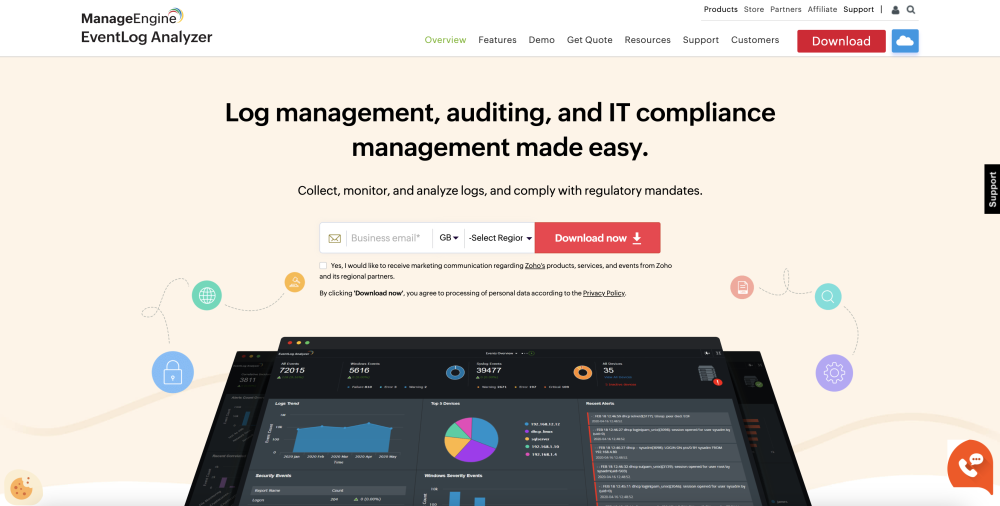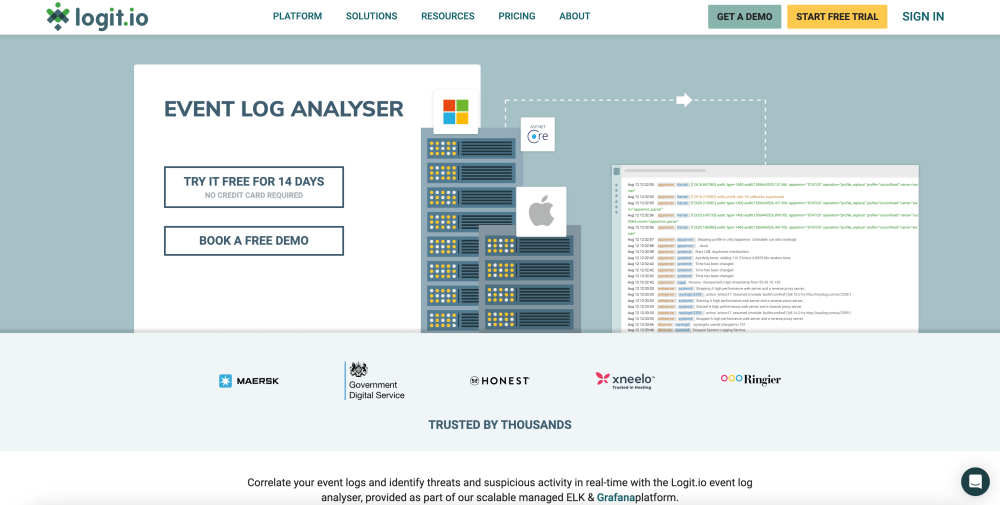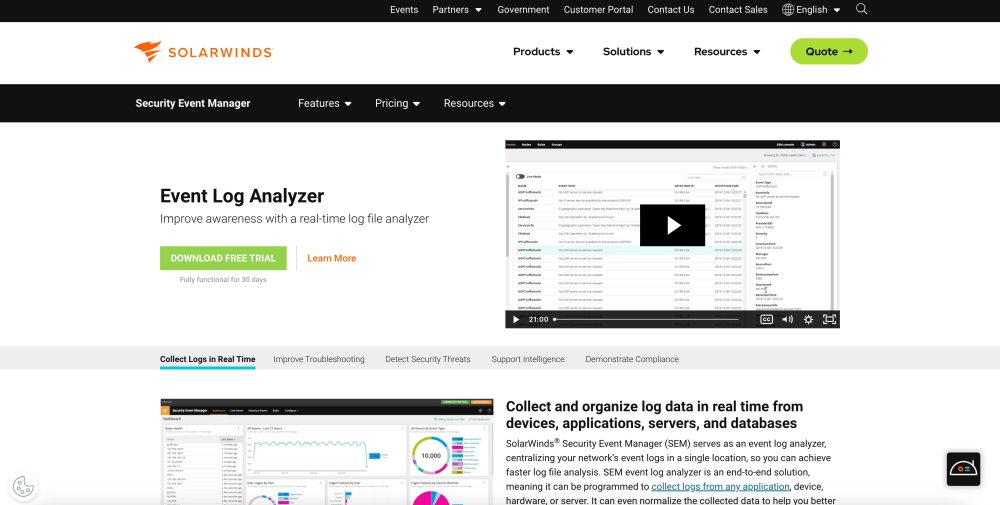Resources
7 min read
Event logs contain critical information and the analysis of these logs will support organizations in the detection of many security incidents, from auditing user access to observing malicious traffic and even isolating monitor rule changes on a firewall. By collecting event logs systematically and analyzing them, organizations can obtain insights into their IT environment for maintaining operational efficiency and security.
Event logs are primarily used to keep historical records, which may be used for troubleshooting, security monitoring, compliance auditing, and performance analysis. This valuable use proves the significance of event logs and necessitates event logs to be analyzed. An event log analyzer is a tool designed for processing and interpreting the volumes of data contained within event logs. It provides a centralized platform for monitoring and investigation by automating the collection, aggregation, and analysis of log data from different sources.
In this article, we go into further detail on what event logs are and their key components, the importance of event logs, and use cases, before finally listing the best event log analyzers currently available.
Contents
What are Event Logs?
Event logs are records of important happenings and activities within a computer system or application. In essence, these logs detail information on events involving system errors, security breaches, user activities, software installations, and system updates. Event logs help in problem-solving, security monitoring, compliance auditing, and performance analysis.
Key Components of Event Logs
An event log contains detailed records of important occurrences within a computer system or application. These records help immensely in troubleshooting, monitoring security, compliance, and performance analysis.
| Event Log Component | Description | Example |
|---|---|---|
| Event Type | Specifies the nature of the event, such as an error, warning, information, audit success, or audit failure. | "Error", "Warning", "Information", "Audit Success", "Audit Failure". |
| Timestamp | The exact date and time when the event occurred. | "2024-05-30 14:35:22". |
| Source | Identifies the system component, application, or service that generated the event. | "System", "Application", "Security", "CustomService". |
| Event ID | A unique identifier for the event, helps categorize and reference specific occurrences. | "Event ID 1001". |
| Severity Level | Indicates the seriousness of the event, such as critical, high, medium, or low. | "Critical", "High", "Medium", "Low". |
| Description | A detailed message describing the event, often including additional data relevant to the event. | "The application failed to start due to a missing DLL file." |
| User Information | Details about the user or account associated with the event, if applicable. | "User: Admin". |
| Category | A classification of the event within a broader context, which can help in sorting and filtering. | "Security", "Application Error", "System Update". |
| Process Information | Details about the process or service involved in the event, such as process ID and name. | "Process ID: 1234, Process Name: explorer.exe". |
| Machine Name | The name of the machine where the event occurred. | "Machine Name: SERVER01". |
The Importance of Event Logs
Event logs offer crucial information relating to activities within a system or application however these logs provide more advantages to users and teams than just this. For example, monitoring event logs offers considerable dividends in debugging and problem-solving system and application issues. Event logs give detailed accounts of errors, warnings, and other significant events happening within a system. By reviewing these logs regularly, IT professionals can easily track the cause of a problem, whether it be an application crash, a hardware failure, or a network problem.
In addition to this, event logs are indispensable to maintaining and enhancing security within an organization. They record events regarding security, including unauthorized access attempts, changes to system configurations, and suspicious activities. Monitoring these logs continuously allows the security teams to detect and act on potential threats in real time to neutralize them before they expand to major breaches. In addition, event logs are historical records that can be used to identify patterns and trends in security incidents for the strengthening of security measures and policies.
Moreover, many industries have very strict regulatory requirements that stipulate mandatory logging and monitoring of system and application activities. Event logs enable organizations to keep an audit trail for all significant events, which is essential for showing compliance during audits and investigations. Continuous monitoring and analysis of the event logs ensure that, should there be any non-conformity to the standard, corrective steps can be taken in a timely fashion to prevent legal penalties and damage to reputation.
Lastly, continuous monitoring and analysis of event logs contribute to a culture of continuous improvement and innovation within an organization. By systematically reviewing the logs, IT teams can detect recurrent problems, fathom hidden inefficiencies, and get an understanding of user behavior and preferences. Such information can be used to inform strategic decisions, drive improvement to processes, and develop innovative solutions to meet changing business needs.
Event Logs: Use Cases
In this section, we cover the major use cases for event logs and illustrate their contribution to a variety of IT management and business operations disciplines. Event logs play a critical role in proactive system maintenance. Monitoring these logs constantly allows IT administrators to find early signs of the development of problems, including hardware failures, software bugs, and degradation in system performance. For example, event logs may point out some system-critical, repeated errors or warnings, which could indicate that a hard drive might fail or that a critical software update did not install properly. The ability to solve such issues before they cause system outages or data loss improves the general stability of a system and helps avoid expensive downtime.
One of the essential applications of event logs is in the area of security and compliance monitoring. Event logs capture all access attempts, whether they were successful or not, along with changes to security settings and other activities of potential security risk. Analysis of these logs can uncover patterns of suspicious activity, including repeated failed login attempts or unauthorized modifications to system configurations that could be indicative of a security breach or insider threat.
Also, event logs become crucial in incident response and forensic analysis in case of security breach or system failure. They provide an intensive record of events before, during, and after an incident and, as such, assist investigators in reconstructing the timeline and gaining insight into the extent and impact of the event. For instance, in a case where there has been a data breach, logs can help to determine how the attackers gained access, what actions were performed by them, and the data that has been compromised. This information is consequently very important for mitigation of damage, and improving security measures to avoid future incidents.
Finally, event logs significantly contribute toward improved customer support and user experience in their own ways. With event logs, it becomes easier for support teams to pinpoint and rectify problems when issues are raised by the users. The logs detail error messages and system states during the occurrence of the issue, which gives the support teams a precise and effective solution. For example, if the user reports the occurrence of a crash within a software application, the event log may highlight the specific error that caused the crash and thus shorten the resolution.
The Leading Event Log Analyzers
ManageEngine Event Log Analyzer

ManageEngine’s Event Log Analyzer enables you to collect, track, monitor, and report security-related events across your network. The solution offers advanced analysis of insights from detected security events and implements sophisticated threat response techniques through automated workflows. Additionally, it helps you demonstrate compliance with regulations such as HIPAA, GDPR, PCI-DSS, SOX, and more by providing audit-ready templates.
Logit.io

Logit.io is a powerful observability platform that offers a dedicated event log analyzer. By utilizing Logit.io’s solution for reporting, alerting, monitoring, and data visualization you attain a centralized view of the health and security of your applications and services. The event log analyzer is both affordable and scalable, offering comprehensive insights within a single platform. As well as this, the tool is fully compliant as a Windows event log analyzer and is also compatible with a wide range of other operating systems, services, and third-party applications.
If you’re interested in finding out more about the benefits that Logit.io’s Event Log Analyzer can provide for your organization, feel free to contact us or begin exploring the platform for yourself with a 14-day free trial.
SolarWinds

SolarWinds Security Event Manager (SEM) serves as an event log analyzer, consolidating your network's event logs into one centralized location and facilitating quicker analysis of log files. The tool can normalize the gathered data, enabling more in-depth analysis of logs and events without the need to contend with unreadable machine data. Also, it enables users to quickly identify unusual patterns and anomalies.
If you've enjoyed this article, why not read What is Log Analysis or The Importance of Security Log Management next?
